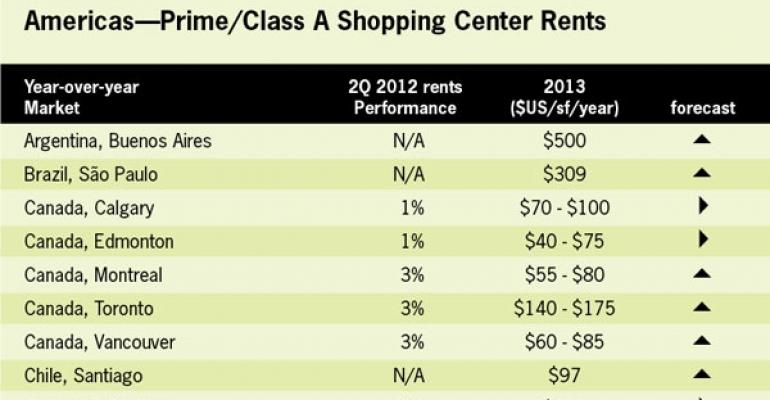Washington, D.C. and Las Vegas may be among the most expensive cities for class-A shopping center rents in the Americas at the moment, but going forward, retailers will see the greatest spikes in rental rates elsewhere, according to Cushman & Wakefield’s and ICSC’s recently released Global Shopping Center Report.
The report projects that in 2013 it will be major Canadian cities, including Montreal, Toronto and Vancouver, that will experience rental hikes, as well as Buenos Aires and Sao Paulo in Latin America. In the second quarter, class-A shopping center rents in Montreal averaged between $55 per sq. ft. and $80 per sq. ft., and in Toronto, between $140 per sq. ft. and $175 per sq. ft. Average class-A rents in Buenos Aires reached as high as $500 per sq. ft., and in Sao Paulo $309 per sq. ft.
In the U.S., the cities that are expected to show rental growth over the coming year include Boston, which posted average class-A rents of $85 per sq. ft. to $95 per sq. ft. in the second quarter; Dallas, which boasts rents of $125 per sq. ft. to $145 per sq. ft.; Houston, with current rents of $135 per sq. ft. to $150 per sq. ft.; and Los Angeles, where class-A rents range between $100 per sq. ft. and $120 per sq. ft. Rents in San Francisco will also continue to rise, according to the report.
On the other hand, rents in Washington, D.C., the New York tri-state region, Chicago and Las Vegas will likely remain flat. Washington, D.C., Chicago and Las Vegas posted drops in average class-A rents from the second quarter of 2011 to the second quarter of 2012, of 2 percent, 5 percent and 8 percent respectively.
Rents in the New York tri-state region rose 4 percent during the same period, to a range of $75 per sq. ft. to $150 per sq. ft.


